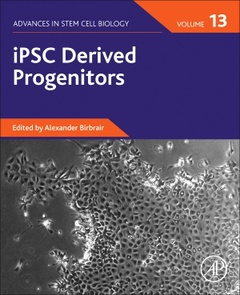iPSC Derived Progenitors Advances in Stem Cell Biology Series
Coordonnateur : Birbrair Alexander

1. iPSC-derived Neural Stem Cells 2. iPSC-derived Craniofacial Mesenchymal Progenitor Cells 3. Human induced pluripotent stem cell-derived astrocyte progenitors as discovery platforms: opportunities and challenges 4. iPSCs derived mesothelial progenitors; implications in cell-based regenerative medicine 5. hiPSC-derived keratinocyte progenitors 6. Induced Pluripotent Stem Cell Derived Bone Progenitors 7. Induced Pluripotent Stem Cells-derived Chondrocyte Progenitors 8. iPSCs Derived Dental Pulp Stem Cells: Future Application in Regenerative Medicine 9. Induced pluripotent stem cell-derived nephron progenitors for kidney organoids 10. Interaction of Mesenchymal Stromal Cells with the GI Tract and Microbiome in the Management of Inflammatory Bowel Disease 11. iPSC-derived hematopoietic progenitors for cellular immunotherapies 12. iPSCs as the Source of Cancer Stem Cells Providing Novel Concepts of Cancer: Gaps between in vitro and in vivo in iPSCs Modeling
- Provides an overview of the fast-moving field of stem cell biology and function, regenerative medicine and therapeutics
- Covers how iPSCs can be differentiated into different progenitors
- Contributed by world renowned experts in the field
Date de parution : 11-2021
Ouvrage de 318 p.
19x23.4 cm



